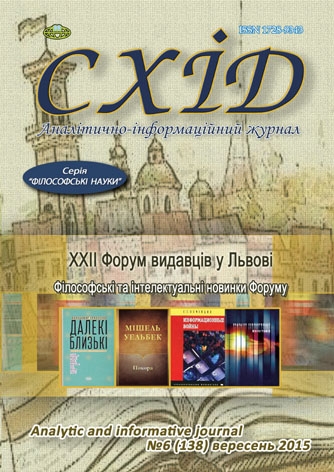Outlines of Christian understanding of communication phenomenon
DOI:
https://doi.org/10.21847/1728-9343.2015.6(138).54637Keywords:
dialogue, kinonia, communication, fellowship, co-existence, community, philosophy of a dialogue, theology of communicationAbstract
The phenomenon of communication from the point of the Christian dogmatics is analyzed in the article. The basic ways of interpreting it are justified on the basis of some church documents and writings of Christian theologians. Among them are: communication as an essential, ontological fact of human existence, which can not be reduced to other ontological facts (J. (Zizioulas), C. Yannaras); personalistic phenomenon (O. Clement); synergy method (D. Staniloae); metaphorical discourse and gift (H. U. Balthasar). They consider the main aspects of the Christian understanding of communication: the co-existence of hypostases of God in one ousia; of God and man; of man and other people through God; of God and the Christian community of people. The theological explanation of communication involves the mutual relationship between God and man, and man and God, based on the dialogic principles as "a meeting of two", experiencing the presence and connection with the Other. The key role of the Trinitarian dogma in the formation of the Christian paradigm of communication is proved. From the standpoint of the principle of dialogism, rooted in the Trinitarian dogma, personological, ecclesiological, and liturgical aspects of communication are considered. Because of the special significance and the most dogmatic elaboration of communication ecclesiology, which is the linking part in the modern theology of communication, it is paid special attention to. The metaphysical mission of the Church to be a place of meeting and talking of man with God not only through prayer, but also through the sacraments and liturgy is emphasized. From this standpoint, the key role of Eucharist for the dialogue between God and man, between people through God is shown. The importance of the Eucharist community, through which the Eucharist from the formal cult of action turns into a living tradition and experience of unity with God is emphasized.
Downloads
References
Thomas Aquinas (2003), Comments on "Politics" Aristotle, Osnovy, Kyiv, 794 p. (ukr).
Archimandrite Kirill (Govorun), Ecclesiology of communion as the common language of the Church tradition, available at: http://duh-i-litera.com/wp-content/uploads/2014/10/GOVORUN-o.-Cyrill-Ekklesiologia-RUS-UspCht-2014.pdf (rus).
Batsevych Ph. S. (2008), Philosophy of language: history student linguophilosophical, "Academia" Publisher, Kyiv, 240 p. (ukr).
Basil of Caesarea (1993), Creation, Vol.3, WP,Moscow, 496 p. (rus).
Gadamer Hans-Georg (2000), Truth and method [translated], Vol. 1, Univers Publisher, Kyiv, 464 p. (ukr).
The documents ofVatican, available at: http://www.vatican.va/roman_curia/ congregations/cfaith/documents/rc_con_cfaith_doc_28051992_co (rus).
Zizioulas John. Being as communion. Study on the individual and the Church, available at: http://predanie.ru/ioann-ziziluas-mitropolit/book/121626-bytie-kak-obschenie (rus).
Zizioulas John (2009), The Church and the Eucharist. Collection of articles about Orthodox ecclesiology, Bogoroditse-Sergijeva pustyn,Yoshkar-Ola, 332 p. (rus).
Peyron Olivier, The priest. The role of communication in dialogue with the culture of theology in the West and in the East, available at: http://duh-i-litera.com/wp-content/uploads/2014/11/PEYRON-Fr.-Olivier-RUS-redYV-et-FL.pdf (rus).
Tönnies Ferdinand (2005), Community and Society [translated], Dukh i Litera, Kyiv, 262 p. (ukr).
Yannaras Christos (2003), Freedom ethos [translated], Dukh i Litera, Kyiv, 268 p. (ukr).
Balthasar Н. U. (1975), Un programme: Communio, in Communio, № 1, pp. 6-19 (lat).
Panikkar Raimundo (1973), The Trinity and the Religious Experience of Man. Icon-Person-Mystery, WP, New York-London (engl).
Downloads
Published
How to Cite
Issue
Section
License
Copyright (c) 2015 Nataliia Ishchuk

This work is licensed under a Creative Commons Attribution-NonCommercial-NoDerivatives 4.0 International License.
1. Authors bear responsibility for the accuracy of facts, quotations, numbers and names used.
2. Manuscripts are not sent back.
3. The publisher does not always agree with the authors' opinion.
4. The authors reserve the right to authorship of the work and pass the first publication right of this work to the journal under the terms of a Creative Commons Attribution-NonCommercial-NoDerivatives 4.0 International License. This license allows others to distribute (copy) the published work for non-commercial purposes, provided there is mandatory attribution to its authors and a link to the first publication in our journal.
5. The authors have the right to conclude separate supplement agreements that relate to non-exclusive work distribution in the form in which it has been published by the journal (for example, to upload the work to the online storage of the journal or publish it as part of a monograph), provided that the reference to the first publication of the work in this journal is included.

